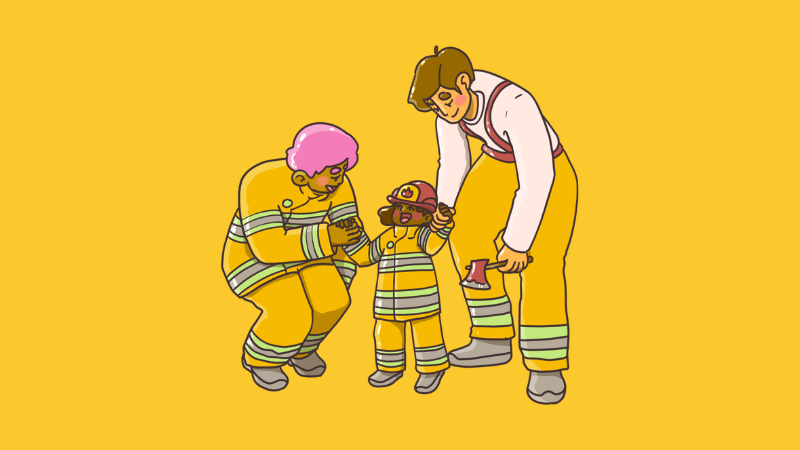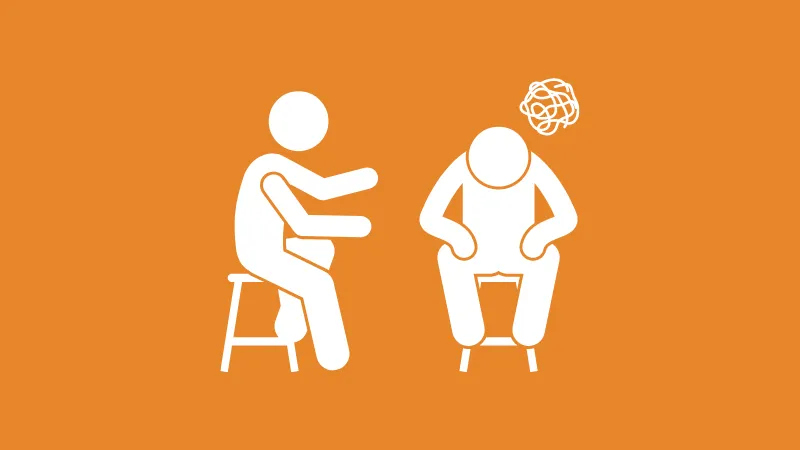Table of Contents
Affiliate link notice: As an affiliate of BetterHelp and other third-party vendors, We will receive compensation if you make a purchase using the links provided on this page. For more information, visit our disclosure page.
Last Updated on April 12, 2024 by Randy Withers, LCMHC
Are you looking for online therapy tips that will help you get results?
Maybe you are ready to try online therapy. Or perhaps you have already started, but don’t feel like you are progressing as much as you had hoped.
Either way, I’ve got you covered. When we’re finished, you’ll know exactly how to optimize your online therapy experience.

My Experience With Online Therapy
As a therapist myself, I hadn’t paid much attention to online therapy until recently. I admit, I was skeptical.
I had concerns about the text-based features of some online counseling platforms.
Could texting with a therapist really help?
My mind changed a few months ago.
It’s tough as a therapist to admit when you yourself need therapy. But, I had reached that point.
I found myself working two jobs and torn between the two. I had also moved across the world and a few months after living abroad, the pandemic hit.
A lifelong runner, I had injured myself and was unable to exercise. I grew depressed but tried to hide it in a constant whirlwind of activity.
It’s easy to preach self-care to your clients while ignoring it yourself.
I decided to try online therapy.
It seemed the best option during the pandemic. I was immediately surprised by how useful and effective online therapy was for me.
But I also learned quickly that online therapy is different from in-person therapy. There are a few extra things you need to know, so let’s talk about them.
My Top 5 Online Therapy Tips
Although online therapy is similar to in-person therapy, there are a few extra steps you’ll need to take.
1. Determine if Online Therapy is Right for You
Before starting online therapy, you first need to determine if it’s a sound option. Consider the following before making a commitment:
Appropriateness of Online Therapy
Online therapy tends to be appropriate for patients dealing with mild to moderate life stressors and mental disorders like anxiety and depression.
Some examples of “good fits” for online therapy include:
- Work/life balance
- Relationship concerns
- Stress management
- Life changes
- Grief and persistent depression
- Generalized anxiety and panic disorders
- Self-esteem/self-confidence.
Some situations require a more “hands-on” approach. Online therapy is probably not a good fit for:
- Anyone not comfortable with technology
- Paranoia and psychosis
- Suicidality and unsafe living situations
- Severe mental illness
- Developmental disabilities
Privacy
Privacy is always a concern in therapy. Online counseling platforms use encrypted communication methods, but you need to protect privacy on your end as well.
I recommend you talk to your therapist behind closed doors, just as you would with a therapist in real life. You can’t have people looking over your shoulder while you talk to your therapist. Not only is it distracting — it is potentially unsafe.
Stable Internet Connection
Unstable connections are frustrating. You don’t want to be talking about deep emotional issues in a video chat only to have your connection go out.
Similarly, if you are texting with your therapist, it is important to have stable phone service and plenty of data. Connectivity issues hinder progress. If you need a new or better internet provider, open up your favorite browser, type “internet providers near me,” and you’ll see a bunch of options.
Safety
If you are in a life-threatening situation, online therapy is not for you. If you are having suicidal thoughts, or being physically abused, online therapy is not appropriate.
If you are in immediate danger, it is always best to call 911 or go to your nearest hospital. Online therapy only works if a client is in a safe space.
2. Plan Ahead
Online therapy requires more logistics than in-person therapy. With in-person therapy, you just need to show up on time to the therapist’s office. For online therapy, there are three essential factors.
The Right Place
Find an area in your living space that is private, quiet, and comfortable. When selecting a place, ask yourself the following questions:
- Will I have enough privacy?
- Is there a place to charge my laptop/phone?
- Is it quiet?
- If using Wi-Fi, do I get strong reception?
The Right Time
Plan sessions at times that best fit your schedule.
Give yourself enough time before, during, and after the session. Be sure to select a time when you won’t feel rushed or be distracted by other obligations.
The Right Internet Connection
Test out your internet before the session.
There’s nothing worse than having your internet connection stall during a session. You will need a speed of 8-10 Mbps or higher for video chats.
3. Set Realistic Goals and Manage Your Expectations
Before starting any type of therapy, it’s important to examine your expectations.
What Do You Want From Therapy?
To get the most out of online therapy, it’s a good idea to set goals.
Ask yourself, “What am I hoping to accomplish from therapy?” If you’re not sure, talk with your therapist. They can help you figure it out.
Be Realistic
Problems built over the course of years will not resolve in one or two sessions. Set realistic expectations. Things may get more challenging before they get better. Trust the therapeutic process.
Be Open
If you enter therapy expecting it not to work, then it probably won’t work.
By setting healthy goals and having realistic expectations, you can thrive in counseling. Be open to what your clinician tells you. Be willing to try something new.
Take Responsibility
The only one that can change you is you.
Although your therapist has the knowledge, skills, and expertise to guide you, you need to do the work. It is not the therapist’s responsibility to change your life. That’s on you.
It is their responsibility to give you the tools you need to implement change. Brainstorm effective methods of change with your therapist. Then, do your homework by implementing these methods.
Set SMART Goals
Write out “SMART” goals for therapy. SMART goals are:
- Specific,
- Measurable,
- Achievable,
- Realistic,
- Timely.
Suppose you struggle with relationship difficulties with your spouse. A goal like “I want my marriage to get better” is too vague.
However, “I want to have a weekly date night with my spouse” is specific, measurable, and achievable. That makes it a “SMART” goal.
Goals help guide therapy. Take some time to develop yours.
3. Come Prepared for Each Session
Preparation is key in online therapy.
Do Your Homework
Homework (also called the “action plan”) is typically a part of therapy.
Why?
As a mentor once told me, “There are 168 hours in a week. Even if you do amazing therapeutic work for one hour, things are unlikely to change if you do not apply anything outside of the session.”
If you blow off therapy homework, you are less likely to get the results you want from counseling.
If your therapist asks you to do something during the week (and you agree to do it), write it down. During the week, if you think, “I want to bring this up in therapy!” Write it down. It will be easier to remember. Or send a text or online chat if possible, when you are thinking about it.
If you are unable to complete your homework, think about why. Was it poor timing? Were you not invested? Bring this up in your next session.
Take Notes/Journal
During your video session or chat, write down anything that you’d like to remember.
It may be helpful to set aside a few minutes following the interaction to journal about what was helpful. You can also explore what you’d like to remember, or what you need to do before your next session.
Speak Up
Don’t be afraid to state what is working and what is not working with your therapist. If you’d like to work on something different during your next session, tell them.
5. Understand the Benefits of Online Counseling
Effectiveness
If you are thinking about trying online counseling, consider the benefits.
Research confirms that online therapy is as effective as in-person therapy. Some studies even suggest cyber-therapy provides greater satisfaction for individuals when compared to in-person therapy, (3.)
Convenience
Not only is online therapy effective, but it is also convenient. This applies to the client and therapist. For both parties, it saves resources to engage in online therapy. There is no commute time and there isn’t any money invested in gas.
Accessibility
You may live in a rural area where it is difficult to find a qualified mental health professional.
Online counseling makes therapy more accessible to more people. Additionally, individuals who are differently abled and/or have physical limitations can receive therapy from the comfort of their home.
Final Thoughts
Online therapy can change your life. But, it is important to first determine if it is the right fit for you.
By taking the time and effort to do research, you can maximize potential success with therapy.
Here is a quick summary of my online therapy tips:
- First, determine if online therapy is right for you;
- Second, maximize therapy benefits by managing logistics;
- Third, prepare for your sessions;
- Fourth, set realistic expectations;
- Fifth, understand the benefits of online therapy.
What have we missed? Comment below and share your best online therapy tips.
References
- Telemental Health Care, an Effective Alternative to Conventional Mental Care: a Systematic Review
- The comparative effect of internet-based cognitive behavioral counseling versus face to face cognitive behavioral counseling in terms of student’s resilience
- [PDF] Client’s Satisfaction in Face-To-Face Counselling and Cyber Counseling Approaches: A Comparison










I’ve been having a hard time with my mental health, so I want to get as much help with it as I can. It makes sense that I would want to get therapy done to help me out with this. I can see how online therapy could be really helpful.